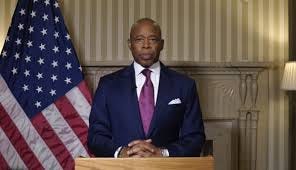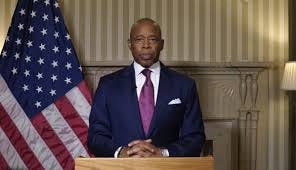For Sale: Mayor of a Large City
Last month, the Southern District of New York indicted New York City Mayor Eric Adams for, among other things, accepting campaign contributions from Turkey.
Justice Briefs is a weekly newsletter devoted to federal criminal prosecution. The federal government’s evolution over the last 230 years has given federal prosecutors significant discretion. Few realize it exists and even fewer know how it is used. Justice Briefs aims to make federal prosecutions and prosecutors more accessible to the general public. Please help me in this endeavor by subscribing and sharing with others.
Justice in Brief
In the Southern District of New York, a former Army private was sentenced to 14 years for providing material support to ISIS, a designated foreign terrorist organization. The Army private communicated with an undercover FBI agent and provided the agent with training and information necessary to attack US Army forces in the Middle East.
In the District of New Jersey, the nation’s 10th largest bank entered a guilty plea to violating the Bank Secrecy Act. The bank opted not to implement various money laundering prevention practices including refusing to file Currency Transaction Reports and Suspicious Activity Reports.
In the District for the District of Columbia, a Michigan man was indicted for securities fraud that involved him making false statements to investors. The man operated a company that produced psychedelic mushrooms and lied about who was operating the company. He omitted his name from the company because he had prior criminal convictions.
How much is that Mayor in the window?
At the end of September, amidst many other high-profile activities, the United States Attorney’s Office for the Southern District of New York unsealed an indictment charging New York City’s Mayor, Eric Adams, with federal offenses. The charges fall into two separate categories. The first involves Adams taking bribes, mostly from Turkey. The second involves Adams falsifying campaign finance records to conceal large campaign contributions and to obtain matching contributions from New York City’s public election funding program. According to the indictment, this activity began before Adams was mayor and has continued through his term as mayor. This is the first time that an incumbent New York City Mayor has been charged with criminal offenses. What exactly does it cost to buy the New York City Mayor?
The tale begins when Adams obtained the Brooklyn Borough President post. To boost his campaign funds, Adams sought contributions from foreign sources, itself a violation of campaign laws. To conceal these contributions, Adams worked through “straw” donors. “Straw” donors are not actual donors but lend their names to the scheme. The true donor gives the money to the “straw” donor and then the “straw” donor provides the money to the campaign. When doing so, the “straw” donor falsely certifies that the money came from the “straw” donor when, in fact, it came from the true donor. In Adams’s case, the money came from various Turkish officials.
In addition to benefitting from the donations to his campaign, Adams used his connections with Turkish officials to travel. Turkey’s government owns the national airline. The Turkish officials arranged for Adams to receive free or discounted air fare to France, China, India, and, of course, Turkey. While in Turkey, Turkish officials also arranged for Adams to enjoy free luxurious accommodations and fine dining meals. As he received these items due to his political position, Adams was required to disclose these trips on financial forms. Adams failed to do this.
Of course, these were not gifts. The Turkish officials sought action in return. The first request came in 2016. As Borough President, Adams supported a Turkish community center in Brooklyn. Turkish officials told Adams that a Turkish dissident group operated the community center. The Turkish officials told Adams that their support would end unless Adams ended his relationship with the community center. Adams agreed to do as the Turkish officials asked.
After election as New York’s Mayor, the Turkish Consulate in New York requested Adams’ assistance with a problem. The Consulate had built a new skyscraper in New York and Turkey’s President scheduled a visit. The building was not yet inhabitable as the fire safety inspection had not been completed. In fact, the building did not have the proper fire safety equipment. The Consulate turned to Adams, requesting Adams to pressure the Fire Department to grant an occupancy permit anyway. When the Fire Department resisted, Adams threatened to fire those who refused to cooperate. The tactic resulted in the Fire Department granting the necessary permit. The Turkish officials also requested advisory positions on Adams’s staff. This included the person who made all of the flight arrangements for Adams.
Once installed as Mayor, the Turkish government requested more favors. One involved Adams not commenting on Armenian Genocide Remembrance Day. The day commemorates the Armenian genocide that occurred during World War I by the Turkish government. For decades the conduct was not recognized as genocide but has been recently recognized. This angers Turkey as they do not identify it as genocide. They also requested Adams intervene when New York City officials attempted to determine whether the new Turkish Consulate conformed to the City’s building code.
The indictment against Adams identifies five offenses. The fifth is bribery under 18 USC 666. This charge is where most of the legal action will take place. This past term, the United States Supreme Court, in Snyder v United States interpreted 18 USC 666 narrowly to only reach payments made for future conduct rather than payments made for past conduct. It was another in a long line of cases interpreting criminal statutes narrowly. While the conduct alleged in Adams’ case involves payments for future conduct, a question arises about whether the conduct requested by Turkey involves conduct “in connection with” the city’s regulation of the Turkish consulate. The indictment alleges four things Adams did: (1) obtaining the occupancy permit from the fire department, (2) hiring someone onto his mayoral transition staff who assisted Adams obtain airline tickets, (3) not making a statement about Armenian genocide, (4) identifying a staff member to be liaison with Turkish officials. Only the last two occurred when Adams was mayor. Only the first covered his time as Brooklyn Borough President. This is important because the statute requires Adams be an agent of a local government agency and have the intent to be influenced in that position. The Turkish consulate building was located in Manhattan so anything during his in Brooklyn would be outside the scope of his agency. Only the third relates to government policy positions. The indictment does not allege this one in connection with the bribery. Thus there is not a clear act that was influenced. Nor is there any transaction involved. Should the case reach the United States Supreme Court, this may lead to the charge being dismissed.
With this said, the bribery is only one of the five counts and the other four appear to be on solid legal footing.
There is one other interesting aspect to this case. It involves Turkey. This is the third high-profile case involving Turkey in the last ten years. The first involved President Donald Trump’s first National Security Advisor, Michael Flynn. Flynn worked on Turkey’s behalf to secure the return of a Turkish dissident. Flynn not only failed to secure the dissident’s return but he failed to register as a foreign agent. The second is the ongoing prosecution of the Turkish National Bank, Halkbank, for violating United States sanctions on Iran. This past fall, the United States Supreme Court ruled the United States could prosecute a foreign bank even if the foreign bank was partially owned by the nation’s government.
These three cases seem to indicate that Turkey has a strong desire to influence United States policy and will go to great lengths to do so. At the same time, they feel free to disregard United States foreign policy. The cases hint at the complex nature of international relations and how criminal prosecutions are just one piece of a much larger puzzle.
I hope you enjoyed this issue and that it made you stop and think. I would love to hear any comments, questions, concerns, or criticisms that you have. Leave a comment or send a message! Also, if you enjoyed this or if it challenged your thinking, please subscribe and share with others!



